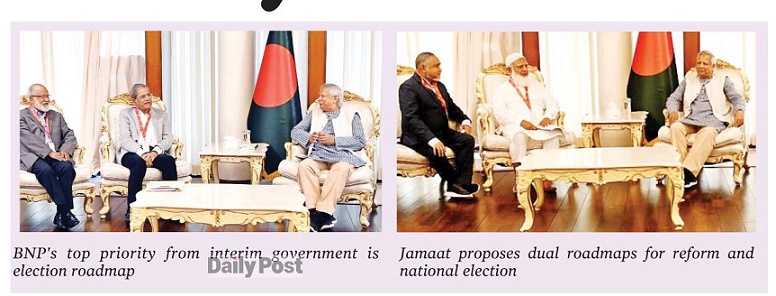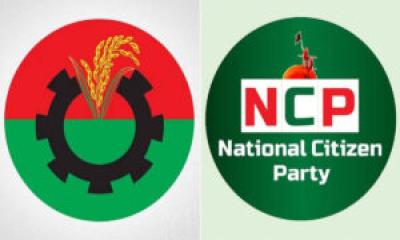# BNP's top priority from interim government is election roadmap: Mirza Fakhrul
# Jamaat proposes dual roadmaps for reform and elections: Dr. Shafiqur Rahman
BNP placed a series of demands to the interim government as the party held a meeting with Chief Adviser Prof Muhammad Yunus and other advisers yesterday.
BNP's demands including removal of "one or two" members of the interim government, legal action against former chief justice ABM Khairul Haque, removal of "partisan judges" from the High Court, scrapping some contractual appointments of bureaucrats.
It also demanded that the interim government announce a roadmap for holding the next election.
BNP also demanded the suspension of the Election Commission Appointment Act, and formation of a new election commission immediately based on the consensus of major political parties.
The dialogue began at 2:30pm at the State Guest House Jamuna.
The BNP delegation was led by the party's Secretary General Mirza Fakhrul Islam Alamgir. Others present in the meeting were BNP standing committee members BNP leader Khandaker Mosharraf Hossain, Mirza Abbas, Nazrul Islam Khan, Abdul Moin Khan and Salahuddin Ahmed
After the meeting, Mirza Fakhrul Islam Alamgir briefed media about their talks and demands.
"There are one or two in the interim government who are obstructing the main sprint of the interim government and the people's uprising. We demanded their removal," he said.
He said they also suggested cancelling some contractual appointees.
The party demanded legal action against former Chief Justice ABM Khairul Haque who according to BNP, was the main man behind "destroying the electoral system and cancellation of the caretaker government system", on charge of sedition.
Additionally, BNP demanded that all the chief election commissioners and other election commissioners be brought to justice for holding farcical and failed national elections in 2014, 2018, and 2024.
BNP also demanded the suspension of the Election Commission Appointment Act, and formation of a new election commission immediately based on the consensus of major political parties.
After BNP's meeting, a seven-member delegation of Jamaat, led by its Amir Shafiqur Rahman, entered the State Guest House Jamuna to hold dialogue with the chief adviser.
Meanwhile, a seven-member delegation of Bangladesh Jamaat-e-Islami has sat for a dialogue with the Interim Government’s Chief Adviser, Professor Muhammad Yunus.
The delegation entered the Chief Advisor's residence, Jamuna, at 3:25pm yesterday.
The Jamaat delegation was led by the party’s Ameer, Shafiqur Rahman. Other members of the team included Jamaat's Naib-e-Amir, Abu Taher Muhammad Abdullah, MM Shamsul Islam, Mujibur Rahman, and Secretary General Mia Golam Parwar.
The Jamaat-e-Islami has proposed two roadmaps during its dialogue with Chief Adviser Dr Muhammad Yunus.
After the meeting held at State Guest House Jamuna on Saturday, Jamaat-e-Islami Ameer, Dr Shafiqur Rahman, briefed reporters on the discussions.
He said: “This government has not come to rule the country; they have come to establish a proper framework for governance. Their role is to create an environment conducive to a free, fair, and peaceful election, which the nation has been deprived of in the last three elections. For that, they need to make reforms on some fundamental issues. We discussed what those fundamental reforms should be.
"We have requested the interim government to focus on two key roadmaps: reforms and elections. Successful reforms will pave the way for successful elections," said Dr. Shafiqur Rahman. He emphasized that these two issues were of utmost importance in their dialogue.
Shafiqur announced that Jamaat-e-Islami will present its party reform proposals at a press conference on October 9.
"From the start, we have advocated for a reasonable timeframe to implement reforms, and we will disclose that timeframe on October 9," he added.
The party plans to reveal its thoughts on the immediate and future reforms needed to stabilize the country.
Regarding the law-and-order situation, Shafiqur said that discussions also covered national unity in the face of various conspiracies.
"We hope the interim government will conduct the elections neutrally, without any bias toward political parties or opposition groups," he said.
Shafiqur criticized the outcomes of the past three national elections, stating that the nation had been deprived of fair, peaceful, and credible elections.
He reiterated that it is now the government's responsibility to create an environment for free and fair elections, highlighting the need for reforms in key areas.
"We have discussed what essential reforms must take place," he said.
Addressing concerns about the members of the reform commission, Shafiqur Rahman said that Jamaat-e-Islami had reservations and had not given its full consent as a party.
He also mentioned that the upcoming Durga Puja celebrations were discussed during the meeting. "Law enforcement and local communities will ensure security during the Puja. We are optimistic that this year’s celebrations will be exceptionally peaceful," he said.
Meanwhile, the interim government commenced its dialogue with different political parties.
According to government sources, Yunus, along with other advisers, is taking part in the dialogue from the government's side. This is the interim government's third phase of dialogue with political parties.
The interim government has already established five commissions to reform the electoral system, police, judiciary, public administration, and anti-corruption institutions.
The reform commissions are: the Electoral System Reform Commission headed by Dr Badiul Alam Majumdar, the Police Administration Reform Commission headed by Sarfaraz Hossain, the Judiciary Reform Commission headed by Justice Shah Abu Naeem Mominur Rahman, Anti-Corruption Reform Commission headed by TIB’s Dr Iftekharuzzaman, Public Administration Reform Commission headed by Abdul Muyeed Chowdhury and Constitution Reform Commission headed by Distinguished Professor at Illinois State University Prof Ali Riaz.
After BNP and Jamaat-e-Islami, the interim government will meet with Ganatantra Mancha at 3:30pm, with the Left Democratic Alliance (LDA) at 4:00pm, with Hefazat-e-Islam at 4:30pm, and with Islami Andolon at 5:00pm.
The component parties of Ganatantra Mancha include Jatiya Samajtantrik Dal (JSD), Nagarik Oikya, Revolutionary Workers Party, Ganosamhati Andolon, Bhasani Anusari Parishad, and Rashtra Sangskar Andolon.
LDA includes CPB, BSD Khalekuzaman, BSD (Marxist), Democratic Revolutionary Party, Revolutionary Communist League, and Bangladesh-er Samajtantrik Party.
Hefazat-e-Islam is a religion-based non-political organisation.
According to sources, Secretary General Maulana Sajidur Rahman has been tasked with leading the delegation from Hefazat-related parties in the dialogue.
Notably, leaders from organisations like Jamiat-e-Ulama-e-Islam, Khelafat Majlish, Bangladesh Khelafat Majlish, Bangladesh Nezami Islami Party, and Bangladesh Khelafat Movement are included in Hefazat's committee.
According to government sources, Awami League and its allies from the 14-party alliance, who were ousted in a student-led mass uprising, will not be invited to the dialogue.
The Jatiya Party has not been invited either, and no decision has been made regarding their participation.
After the Durga Puja, the Chief Advisor will again sit for dialogue next Saturday.
Sources say that discussions with Gana Odhikar Parishad and the Amar Bangladesh Party (ABP) may take place on the Saturday after that.
ZH






